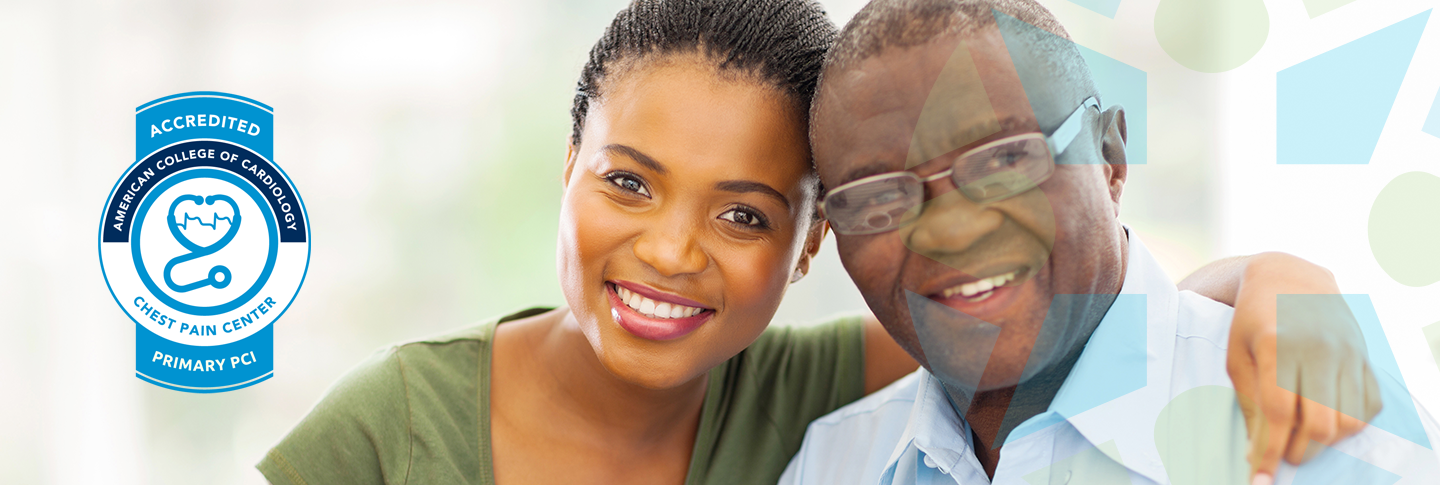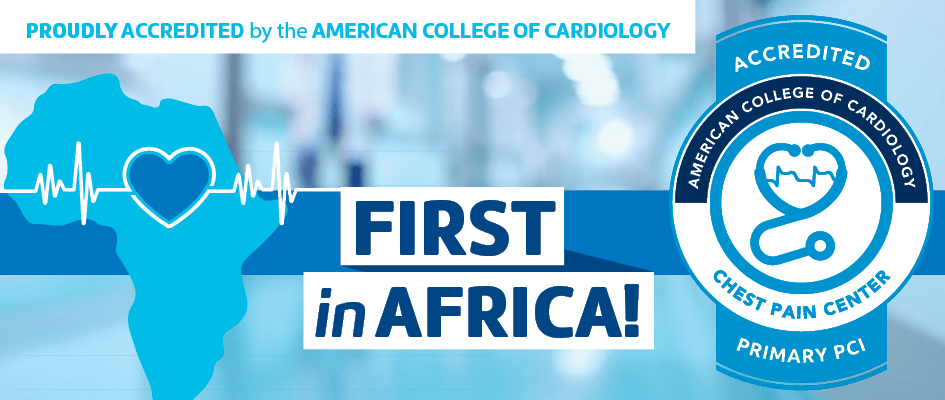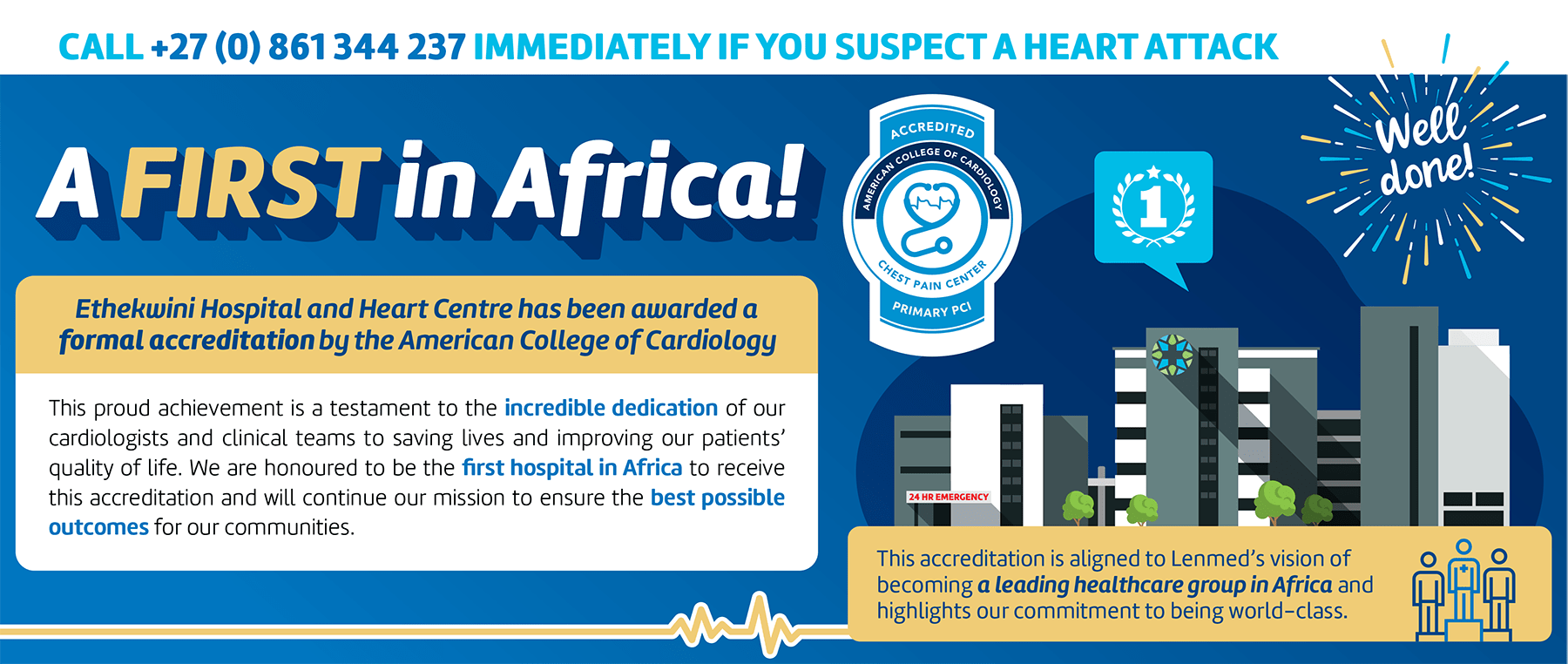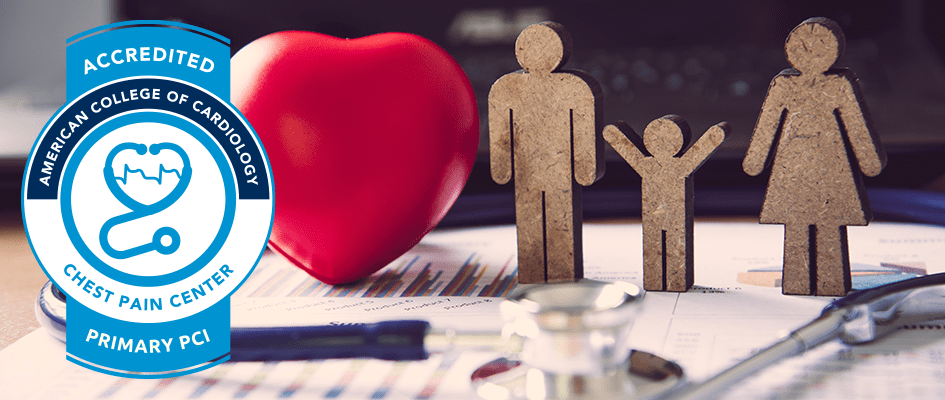
Lenmed Ethekwini Hospital and Heart Centre accredited by American College of Cardiology
Lenmed Ethekwini Hospital and Heart Centre has been recognised by the American College of Cardiology (ACC) for its demonstrated expertise and commitment in treating patients with heart attacks. This achievement is a ground-breaking milestone.
Lenmed Ethekwini Hospital and Heart Centre is the first in Africa to be awarded Chest Pain Centre Accreditation with Primary Percutaneous Coronary Intervention (PCI), based on a rigorous evaluation of the hospital team’s ability to evaluate, diagnose, and treat patients who may be experiencing a heart attack.
- The ultimate outcome is improved patient care and the long-term benefit for people who present to Lenmed Ethekwini Hospital and Heart Centre with a heart attack.
- According to the American College of Cardiology (ACC), achieving accreditation status improves patient throughput as well as the quality and consistency of care.
- Achieving accreditation shows the community our commitment to offering exceptional cardiac care.
- Achieving accreditation status better positions Lenmed Ethekwini Hospital and Heart Centre as a preferred provider of cardiovascular care.
- Accreditation offers processes for timely and accurate diagnosis and treatment.
- Accreditation enhances quality outcomes.
[vplayer id=’25674′]
[vplayer id=’25675′]
Cardiovasuclar Education
Facts about the human heart
- Incredibly, the human heart will beat around 3 billion times from birth to the age of 90 years.
- Your heart keeps blood flowing around your body.
- Your heart accepts blood from your organs and tissues and pumps it to your lungs to be enriched with oxygen. The blood rich in oxygen goes back to your heart and is pumped to the tissues of your body to supply them with oxygen. Blood filled with carbon dioxide and waste products are circulated away from the tissues to be cleaned.
Heart attacks: What you need to know
A heart attack occurs when a part of your heart muscle doesn’t get sufficient blood. Coronary artery disease (CAD) is the main cause of a heart attack. A less common cause of a heart attack is a severe spasm, or sudden contraction, of a coronary artery that can prevent blood flow to your heart muscle.
Common symptoms and signs of a heart attack:
- Cold sweat
- Fatigue
- Light-headedness or sudden dizziness
- Nausea, indigestion, heartburn or abdominal pain
- Pain or discomfort in your jaw, neck or back
Some heart attacks happen suddenly. Sometimes people have warning signs and symptoms hours, days or weeks before they experience a heart attack. You may experience the earliest warning which is recurrent chest pain or pressure (angina) that is triggered by activity and eased by rest.
What should you do if you are having a heart attack?
Make sure to get immediate help. If you’re alone, call emergency services. The quicker you can get to an emergency room, the sooner you can have treatment to decrease the amount of damage to your heart muscle.
If you see someone who is unconscious and you think they are having a heart attack, you should call for emergency medical assistance. Then check to see if the person is breathing and has a pulse. If they aren’t breathing or you can’t find a pulse, start cardiopulmonary resuscitation (CPR). If you aren’t trained in CPR, press down on their chest in a fast rhythm – about 100-120 compressions a minute.
Recovery after a heart attack:
If you’ve had a heart attack, there may be damage to your heart. You might be at risk for another heart attack or a stroke.
You can decrease your chances of having future health problems after you’ve had a heart attack:
- Speak to your healthcare team about the things you do every day at work and at home.
- Lifestyle changes such as eating a healthier diet, doing more physical activity, stopping smoking and managing stress, as well as taking prescribed medicines can assist in improving your heart health and quality of life.
- Cardiac rehabilitation, a supervised programme, includes physical activity, education about healthy living, and counselling.







